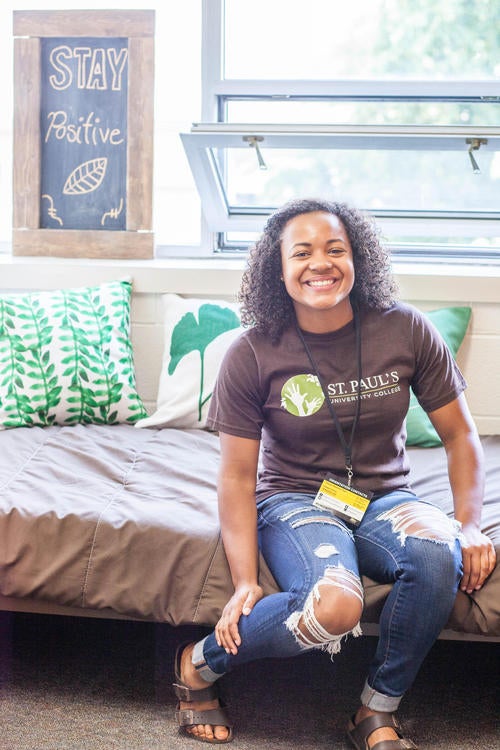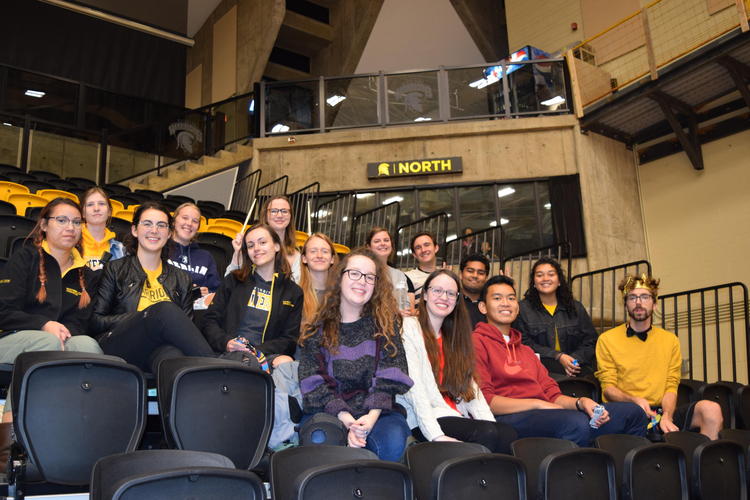Zoë Lawrence has a lot of good memories of her first year at St. Paul’s. She loved the Faculty of Environment’s small living-learning community and her involvement in activities like the GreenTeam encouraged her to switch her major to one that was a better fit for her environmental interests.
But her favourite memory is of Mariah, her Residence don, who organized ‘tea time’, a weekly get-together that helped Zoë and her fellow first-year students make friends and adapt to university life.

Mariah Smith pictured above, inspired Zoë to seek out student leadership opportunities and give back to the College community.
“In first year, you’re so stressed,” Zoë says. “It’s great to have someone knock on your door and invite you to a dance party in the hallway.”
“Mariah was so energetic and had all these ideas,” she adds. “She wanted everything to be the best for the people on her floor. She’s probably one of my biggest influences at St. Paul’s.”
Now in her second year at the University of Waterloo, Zoë — like Mariah — is helping students experience everything St. Paul’s has to offer. She’s President of the St. Paul’s Student Union, a new initiative that aims to support students in a variety of ways while giving them a voice in the ongoing development of the College.
A voice for St. Paul’s students

Rick Myers, right, speaks with an International Development student about her poster presentation at INDEV Capstone event.
When Principal Rick Myers arrived at St. Paul’s in 2016, he was surprised to find that, other than the Activities Council Executive (ACE), the College had no form of student government.
That was a concern for him in terms of both student support and representation, as well as the well-being of St. Paul’s as a whole.
“If an institution is going to move forward in some significant new direction that in any way involves students, you need to be able to ask students ‘What’s on your mind? What are your concerns?’ You want to harness their energy and their support and you can't do that if there's no organization there to speak for them,” he says.
“But the more important role for a student organization is to represent students, to articulate and defend their interests and to work collaboratively with the administration of the institution to advance both the goals of the students and the goals of the institution. We did not have that and I think it was a serious shortcoming.”
To rectify the situation, a working group made up of upper-year student volunteers was formed. Their goal? To gauge interest for an association among the student body and then to create a draft constitution which could be put to a vote.
In a referendum held in the winter of 2018, students voted unanimously to accept the constitution and, after approval by the College’s Board of Governors, the St. Paul’s Student Union launched.
As the new organization finds its feet this year, it does so with the full support of the College’s administration. The Student Union’s President has a seat on the College’s Board of Governors and St. Paul’s is covering Student Union fees for all first-year students. In addition, College staff, including Steve Prentice, Residence and Community Life Manager, act as advisors.
“We don’t want to tell the Student Union what to do; instead, we’ll offer tools and support to help them succeed,” Steve says.
Keeping community alive
St. Paul’s is known for its warm, welcoming environment. However a major challenge the Student Union faces is how to maintain that environment when the majority of students live in residence only during their first year.
“One of the tasks for the Student Union is to identify how we can keep that sense of community alive as upper-year students move off-campus. We need to find ways they can continue to be engaged,” Steve says.
The executive is currently consulting with students to find what programs and services they think are important, both while they’re living at the College and afterwards.

Upper year students can choose to continue participating in many College life activities such as the Women's basketball team Booster Club
The Student Union itself is one option. While the executive is elected from among upper-year students, first-year students will be encouraged to apply for volunteer Officer positions where they might manage the tuck shop or help organize activities. Then hopefully, when these first-years become upper-year students, they’ll continue their involvement as members of the executive or in other capacities.
But whether or not students choose to be involved in the Student Union, they are always welcome at the College.

Zoë Lawrence, St. Paul's Student Union President
“We want students to know that we’re here for them throughout their entire time at UWaterloo,” Zoë says. “There are so many advantages to getting involved with activities at the College, from making friends to mental health support. If you enjoyed your time at St. Paul’s you shouldn’t be afraid to come back.”
“There’s a community here where you’ll always belong.”
Gifts to the Residence Life Experience Fund support current student activities like the Student Union, Women's Basketball Booster Club, the Jackman Reading Room Book Project, and future projects like a music practice room and art studio.












